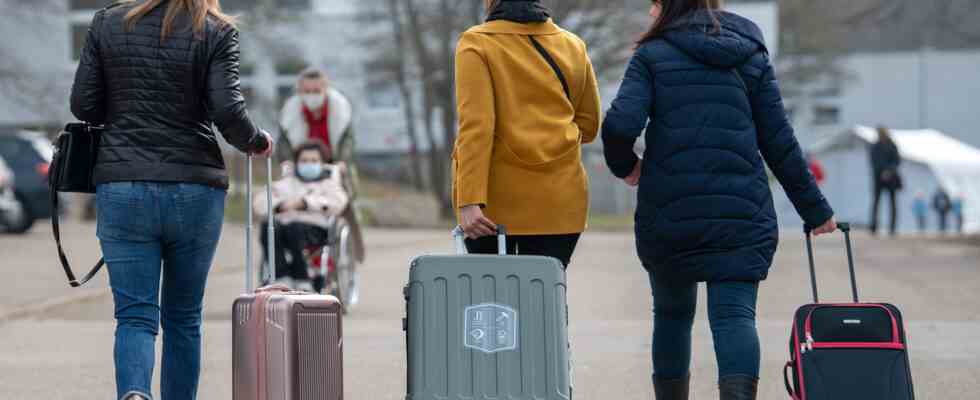Status: 03/27/2022 11:42 a.m
Federal Interior Minister Faeser does not want all refugees from Ukraine to be registered in Germany, as the Union is demanding. The Bavarian Interior Minister Herrmann warned of a security gap.
Federal Minister of the Interior Nancy Faeser rejects the registration of all refugees from Ukraine in Germany demanded by the Union. “We’re talking primarily about children and women who have been fleeing for days, who had to endure the cold at the Polish border,” the minister told the “Tagesspiegel”. The refugees should not be held up for checks at the German border. “Just to clarify: people have the right to move freely here,” emphasized Faeser in the interview.
“Anyone who comes from a third country will be registered”
The SPD politician rejected allegations by CDU leader Friedrich Merz that it was hardly known who was actually coming to the country and where the people were staying. “The federal police get on the trains when they cross the border and check all passports. Anyone who doesn’t have a passport or comes from a third country is recorded and registered,” Faeser told the newspaper.
Federal Interior Minister Faeser does not want all refugees from Ukraine to be registered in Germany.
Image: EPA
According to the minister, 95 percent of people fleeing from Ukraine to Germany are also Ukrainian nationals. So far, there is no evidence that Belarus, for example, is specifically sending people to Europe. There is also no evidence of possible terrorists who could try to come to Europe with the Ukrainian refugees.
Bavaria’s interior minister warns of security gaps
The Bavarian Minister of the Interior, Joachim Herrmann, warned of a security gap when taking in Ukrainian refugees. “It is important that identification measures ensure that the arriving people can be identified,” said the chairman of the conference of interior ministers to the newspapers of the Funke media group.
Although the Ukrainian war refugees must be helped unbureaucratically and quickly, the security aspect must not be neglected, emphasized Herrmann. “We have to know who is coming to us and avoid smugglers, human traffickers, organized crime or other criminals taking advantage of the situation for their own ends.”
Herrmann called on the other federal states to follow the Bavarian example. There the police not only register arriving refugees, but there are also identification measures. The personal details would be compared with the search databases. “I also expect a structured and coordinated approach from the other federal states,” said the CSU politician.
266,975 people from Ukraine recorded
Since the beginning of the Russian attack around a month ago, the federal police alone have recorded 266,975 refugees from Ukraine in Germany. This was announced by the Federal Ministry of the Interior via Twitter. Most of them are women, children and old people. The actual number of refugees is unknown because there are no comprehensive border controls – it is likely to be significantly higher.
It is also not recorded how many people travel on from Germany to other countries. Ukrainians also do not have to register with the German authorities because they can enter the country without a visa for 90 days. They are only recorded by the authorities when they report to them, for example to claim state aid.
Visa easing for opposition Russians demanded
The Federal Government Commissioner for Human Rights, Luise Amtsberg, is calling for visa easing for Russian human rights activists. This should make it easier for them to go into exile in Germany. “Within Russia, the repression against those who think differently, especially as a reaction to the war, is becoming increasingly severe,” she told the “Welt am Sonntag”.
“We have a duty to help these courageous people, because they too are defending freedom, democracy and human rights in Europe.” She would like “that we develop a separate profile grid for humanitarian visas, analogous to what already exists for Belarusian human rights defenders”.
After the protests in Belarus last year, the federal government decided to grant a residence permit on humanitarian grounds to individuals who were persecuted for political reasons.

